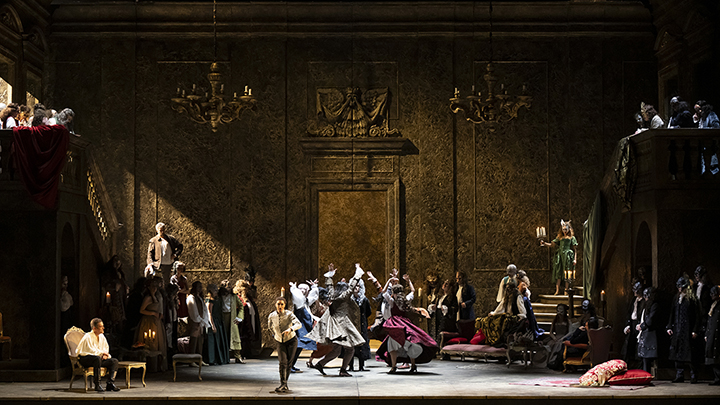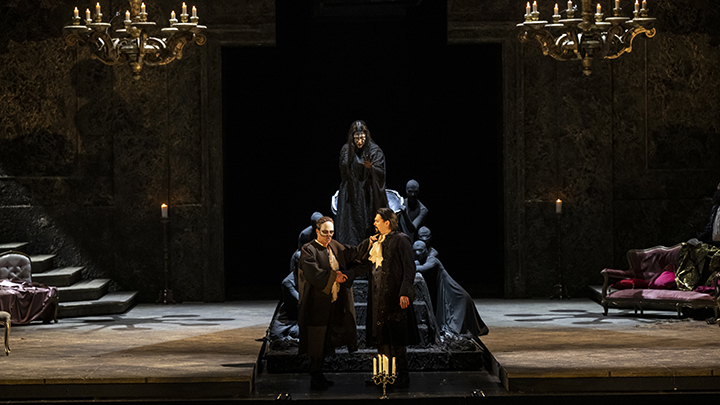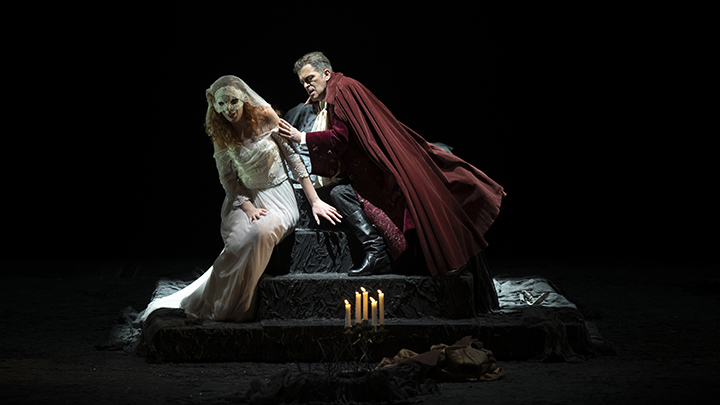
The Teatro Regio in Turin is one of the opera houses offering some of the most interesting shows of the 2023/24 Italian season. Among the obsolete titles, it is worth mentioning a memorable production of La Juive by Halévy, an opera that had not been seen in all of Italy for almost twenty years, last October. Among the great repertoire titles, Verdi’s Un ballo in Maschera, which was performed in Turin seven nights between February and March stands out.
The greatest interest of this Verdi production lay in Riccardo Muti’s conducting. Muti is currently the doyen of Italian orchestra conductors and one of the oldest in the world among those who dedicate themselves to the performance of opera at a high level — with strict control over the voices — in the wake of a long tradition considered to be “Italian style,” while always opposing performance practices that disrespect the score (cuts, modifications, intrusions, etc. – which are, for the record, equally part of the twentieth-century Italian tradition). After long collaborations with important Italian opera houses (Florence, Milan, Rome), Muti does not currently have any stable connection with a theatre, which is why each new appearance as an opera conductor arouses particular interest and public draw.
In Turin, where he had already conducted Don Giovanni in 2022 and Così fan tutte in 2021, 2024 brought Un ballo in maschera, one of the first operas he ever performed (in Florence, in 1971, with Cristina Deutekom, Richard Tucker, and Renato Bruson). Muti’s more than half-a-century-long association with this title – including a recent concert performance with the Chicago Symphony Orchestra (in 2022, with Joyce El-Khoury, Francesco Meli, and Luca Salsi) – allows us to trace the interpretative history of this conductor who has identified himself with Verdi perhaps more than any other composer. It would be enough to compare his official studio recording of this work (in 1975, with Martina Arroyo, Plácido Domingo, and Piero Cappuccilli) with the recent performances in Turin to confirm that today Muti is no longer totally ‘Mutian,’ by which I mean to call to mind the very fast tempos, explosive sounds, and fiery energy that made many love the young Muti’s performances for their impetuosity (but also made some hate them for their excesses).
The Prelude to the second act of the opera, without the contribution of singers who have always changed over time, can be a good litmus test for some comparison. Wanting to recover a dichotomy often used in aesthetic reasoning, his ‘Dionysian’ (overwhelming, euphoric) interpretations of the past have left room for more calm, classic, ‘Apollonian’ performances. In short, his current Un ballo in maschera seems closer to what Herbert von Karajan recorded just in time before his death (1989) rather than to the thoroughly documented ‘Riccardo Muti’ that we have in recent memory. Nonetheless, Karajan’s always beautiful and rounded sound is contrasted in Muti with a texture that, when necessary, can be scratchy or boastful. But what pleasure when we are given to enjoy the subtle and repeated game of hesitations, so dear to today’s Muti: agogic hesitations, with the unexpected delay of a harmonic or melodic resolution; dynamic hesitations, with fortissimo suddenly becoming pianissimo, or the addition of an accent that changes the flavor of a melody…
The vocal cast that Muti had available in Turin was very interesting: in the three main parts, three very valid singers who are now particularly close to him. The tenor Piero Pretti is probably at the artistic peak of his career. In a recent review of his Don Carlo, I underlined the confidence with which he tackles even the most difficult phrases. The timbre of the voice is not very unique or distinctive, but clear and brilliant, as is well suited to the part of Riccardo. There was therefore a great contrast between his voice and that of the soprano Lidia Fridman, vigorous, bold, sometimes harsh (in December she sang Nabucco with Muti in Ravenna) and certainly darker than the mezzo-soprano Alla Pozniak. In the duet between Amelia and Ulrica, the vocal weights sounded reversed compared to the usual.
Luca Micheletti, performing Renato, is destined to be one of the baritone of reference for the Verdi repertoire in the coming years. Although on some nights his singing performance was limited by indisposition, his ability to create characters with voice and gesture at the level of a great actor balanced out some occasionally weaker and more unfocused utterances. The rendition of Oscar by the light soprano Damiana Mizzi was delightful, never affected, and the supporting roles were all of a good standard, taken on by singers who are used to playing main characters: Daniel Giulianini (Samuel), Luca Dall’Amico (Tom), Sergio Vitale (Silvano), Riccardo Rados (A judge and Amelia’s servant).
Finally, in order to address the stage direction, entrusted to Andrea De Rosa, it is necessary to return to talking about Riccardo Muti, who for thirty years has been waging a personal battle against stagings that violate the original dramaturgy of the work: hence his frequent choice for concert performances or with the collaboration of trusted directors who do not distort the original characters and settings. In reality, Nicolas Bovey’s sets, Ilaria Ariemme’s costumes and Alessio Maria Romano’s choreography seemed more appropriate to the carefree first-scene of Rigoletto than to the serious governor’s palace in Boston. The monumental spaces were filled with colored drapes and imaginative costumes that animated a frivolous court, and enriched by repeatedly emerging symbols of who-knows-what hidden metaphors (such as an omnipresent lit candelabra), However, those many and varied elements appeared to have been brought to the stage just to draw attention away from the void. But anything can be accepted in order to once again enjoy a Verdi opera conducted by Riccardo Muti!
Photos: Andrea Macchia/Teatro Regio Torino




























Comments